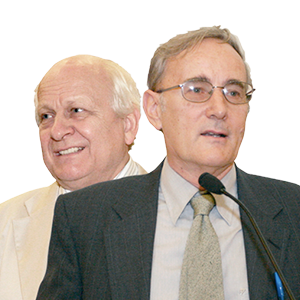
Tibor Varady / Gyula Kodolányi
[Tibor] Professor, Department of Legal Studies, Central European University
[Gyula] Writer/Editor-in-Chief Magyar Szemle (Hungarian Review)
Emerging Democracies and Economies of Eastern Europe - A Case Study on Yugoslavia and Hungary
7 March 2008
Since the break between Tito and Stalin in 1948, Yugoslavia became the most open and most Western-oriented among communist countries. Its ties with the West became gradually stronger and stronger, and its economy became a mixed economy including market elements. It was generally expected that Yugoslavia could be the first country to join European integrations. This is not what happened. Yugoslavia ruined this position at the time when communism was collapsing towards the end of the eighties. Communist leaders became extreme nationalists, and this fact became an unbearable predicament in a multi - ethnic state. The result of ethnic intolerance was the dissolution of Yugoslavia.
In contrast, Hungary was in the forefront of the transitions in East Central Europe. During the peaceful long revolution of 1988-89, the democratic opposition laid the groundwork for parliamentary democracy and negotiated the conditions and guarantees of constitutional change with the ruling Communist party.
The first democratic government of centre right József Antall (1990-1993) created the legal structure of civil rights and the institutions of a market economy. It made bold steps toward Hungary's eventual entry into NATO and the European Union. It also created opportunities for a new national middle class.
Both are emerging economies in Eastern Europe watched closely by the world. Yet Yugoslavia and Hungary chose contrasting paths in their journey towards democracy, modernization and globalization. Join prominent Hungarians, Professor Tibor Varady and Mr Gyula Kodolányi as they unravel the historical and political web behind these two Eastern European neighbours.
About The Speaker
Tibor Varady
Former Minister of Justice of Yugoslavia in the Panic government from June 1992 to March 1993, Professor Tibor Varady is an internationally-recognized scholar and expert on international trade, commercial transactions and dispute settlement. He was on the faculty of the Novi Sad Law School in the former Yugoslavia and served as director of its Center for International Studies for many years.
Since July 1993, Professor Varady has been a professor in the Legal Studies Department of the Central European University in Budapest and chairman of the International Business Law Program. He is a member of the Hague Permanent Court of Arbitration and is on the list of arbitrators of eight arbitral institutions, including institutions in the former Yugoslavia, in Hungary and in Egypt.
Professor Varady also acted as agent and counsel in 11 cases before the International Court of Justice.
Professor Varady has written more than 200 publications in five languages. His most recent publications include: International Commercial Arbitration (with co-authors J. Barcelo and A. Von Mehren) 3d Edition Thomson & West 2006; Language and Translation in International Commercial Arbitration, T.M.C. Asser Press 2006.
Professor Varady was appointed as a professor at Emory Law in 1999 and teaches spring courses on international commercial arbitration and international business transactions.
Gyula Kodolányi
Gyula Kodolányi is the author of several collections of poetry, essays and translations. His first collection of poetry, The Sea and the Wind Endlessly, published in 1981, was awarded the Mikes Kelemen Prize for best book of the year by Hungarian writers in exile.
Kodolányi has played a significant role in Hungarian politics since the late 1970s. As a poet and professor of English and American literature, he was drawn at that time into the growing Hungarian opposition.
He was a founding member of the Hungarian Democratic Forum (MDF) in 1987, which won parliamentary elections three years later and formed Hungary’s first democratic government since 1948.
He served as Senior Foreign Policy Advisor to Prime Ministers József Antall and Péter Boross in 1990-94, on U.S. and European relations, with a special focus on NATO integration. Since that time, he has continued both his political and his poetic activities, advising former Hungarian President Ferenc Mádl, and editing a political and intellectual bimonthly, Magyar Szemle in Budapest.